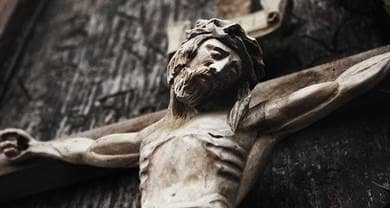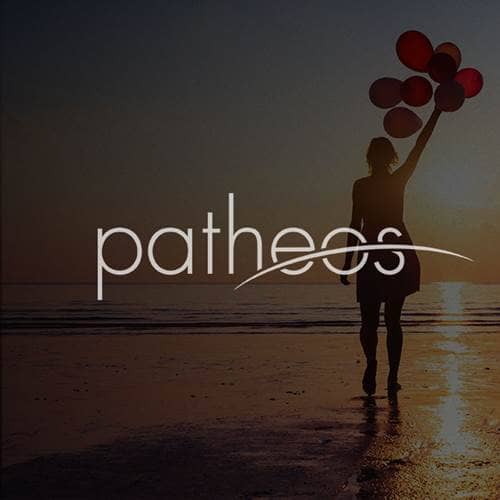- Trending:
- Pope Leo Xiv
- |
- Israel
- |
- Trump
- |
- Social Justice
- |
- Peace
- |
- Love

RELIGION LIBRARY
Roman Catholicism
Human Nature and the Purpose of Existence
The first time humans appear in the Bible, they are being created "in the image of God" (Genesis 1:27) as the concluding part of a creation that God continually calls "very good." While some Christian theologies hold humans to be intrinsically evil due to the sin committed after this creation, Catholics believe that humans are intrinsically good because they were created in the image of the good God. This is known theologically as the imago dei (Latin for "image of God"), and it is a lynchpin of the Catholic understanding of human nature.
Nevertheless, sin has transformed human nature. It has broken the mirror, as it were, in which humans were supposed to reflect the divine life. Sin entered the world when humans disobeyed a decree from God; afterward humans were forced to leave the Garden of Eden, the perfect home that had been created for them, and go out into the world to toil and suffer. Catholics believe that the effects of this disobedience were even more far reaching: sin marked the soul of the first humans in such a way that it would be transmitted to all succeeding generations. Original sin, as it is called, is a state of being rather than a condition of guilt; from the moment of their birth humans are able to reflect God's holiness only imperfectly. Humans were created to submit instinctively and freely to God in all their actions, but original sin mars their will so that it does not always point in the direction of obedience to God.
St. Augustine believed that original sin so deeply marked grooves of corruption in the human soul that it was actually unable to choose the good without the healing effects of God's grace. This has been an influential view, but in general the Catholic Church's understanding of original sin follows the explanation provided by St. Thomas Aquinas (1225-1274), who saw original sin as the inherited tendency of the soul to choose a lesser good rather than the greater good of obedience to God. Humans are therefore flawed images of God, but the goodness of their original creation remains.
The concept of original sin stands as a backdrop to Catholic thought on human nature, with the imago dei front and center. It is actually from their creation in the image of God that humans obtain the freedom of the will that allows them to act sinfully and keep their broken relationship with God from being healed. Catholics reject the idea that humans are predestined to act in one manner or the other: both their sin and their obedience are the result of free choice. God is all-powerful and could simply will humans to be good, but Catholics believe that God chooses to limit divine action in order to preserve human freedom. Similarly, while God's infinite knowledge may foreknow what humans will choose, this does not impinge on the freedom of their choice in any way.
Catholics hold that humans have an innate sense of what is right and what is wrong, called natural law, written into the core of their being. Natural law transcends society and culture; social norms help humans understand what is acceptable in a given society, but natural law gives them a clear knowledge of good and evil. According to St. Thomas Aquinas, natural law allows humans to act in a moral manner, prompting them to choose the greater good of obedience to God rather than the lesser good of following their own desires. What it does not provide is the knowledge of what is necessary for salvation, namely belief in Christ.
Salvation is the goal of human existence. Humans were created to live in harmony with God, a relationship broken through sin. But just as the first humans represented all humanity when they chose sin over obedience, so Jesus the Christ represented all humanity when he chose obedience to God over personal desire. With his death and resurrection, Catholics believe, Jesus the Christ repaired the basis of the human-divine relationship, making it once again possible for humans to attain the goal for which they were created.
The way that humans experience this repaired relationship is through grace, which is the loving benevolence of God freely offered to humans. Grace is a vitally important concept for Catholics, who believe that God offers grace to humans at all times, although in their brokenness they often refuse to accept it. When humans do accept the grace offered to them, their brokenness is overcome and they are able to be co-creators with God in the good.
Catholics believe that a repaired relationship with God leads to actions of goodness since it returns humans to their original purpose of loving and serving God and each other. These are not two separate aims: humans serve God by serving others. This service can take place in very concrete ways, such as teaching children, helping the poor and caring for the sick, or in more meditative ways, such as praying for others and performing penance for their sins.
Study Questions:
1. Are humans inherently good or evil? Explain.
2. Why is sin an ontological problem?
3. How to Catholics understand predestination and free will? What serves as a moral guide?
4. Why is grace important to the human-divine relationship?
5. Why is service to humanity an important part of Catholicism’s purpose of existence?










